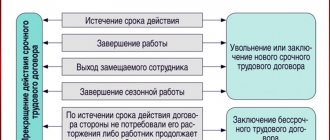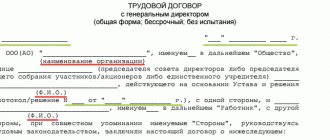Dismissal upon expiration of the employment contract
The employee must be notified in writing of the termination of the labor contract due to its expiration at least three calendar days before dismissal, except in cases where the period of validity of the labor contract concluded during the performance of the duties of the absent employee expires.
The original notification is given to the employee personally, and on the copy of the notification he must put a personal signature with a transcript, as well as indicate the date of receipt of the notification. A copy of the document is filed in the employee’s personal file.
If you refuse to familiarize yourself with the notification, a corresponding act is drawn up.
Written application for termination of TD
The employee must first write a statement and then submit it to the employer. Such an expression of the employee’s will is a mandatory step in the case of voluntary dismissal and is important for both participants in the labor relationship:
- For an employee, filing such an application means that his right to dismiss at his own request will not be violated. This statement confirms the voluntary nature of the employee’s desire to resign (early).
- For the employer, receiving such a notice means that the employee will not be able to subsequently go to court with a demand to declare the dismissal illegal, as well as with a demand for reinstatement at work.
This is exactly how judicial practice develops: if the employer does not have a statement, it is impossible to prove that the employee was dismissed legally at his own request.
Therefore, if an employee goes to court with a demand for reinstatement at work, then his demand is satisfied in most cases (see the Appeal ruling of the Supreme Court of the Republic of Karelia dated January 10, 2014 in case No. 33-211/2014). Of course, such notice also prevents employers from dismissing employees without legal grounds.
Expiration of a fixed-term employment contract to perform work
The dismissal procedure after the expiration of the employment contract concluded for the duration of the specific work begins with the preparation of an act of acceptance of work performed according to the STD. This is the basis for termination.
To do this, you can use the act of the unified form No. T-73, approved by the Resolution of the State Statistics Committee of Russia dated January 5, 2004 No. 1 “On approval of unified forms of primary accounting documentation for the accounting of labor and its payment.” However, the use of this form is not mandatory. The parties can draw up an act in free form.
The act is drawn up in two identical copies. The employer's copy is filed in the employee's personal file. The expiration date of the STD will be the day following the date of issue of the act.
Features for certain categories of workers
Termination of a fixed-term employment contract with certain categories of employees has certain nuances. In particular, the legislation specifically protects the right to work of pregnant women. For this category of employees, the employment contract is extended until the end of pregnancy or until the end of maternity leave (in accordance with Part 2 of Article 261 of the Labor Code).
At the same time, in order for the employment contract with a pregnant woman to be extended, she should:
- Confirm your pregnancy with documentation (in particular, a medical certificate).
- Submit an application to the employer to extend the term of the contract.
When extending the contract until the end of pregnancy, a woman should undergo a procedure to confirm the fact of pregnancy every three months (that is, constantly take a new certificate from the antenatal clinic).
The employer will have a week to dismiss from the day he learned about the end of the employee’s pregnancy. When a woman goes on maternity leave, she can be fired on the day it ends.
If a fixed-term employment contract with a pregnant woman is concluded for the purpose of replacing an employee, then when the latter returns to work, the woman “in a position” may be fired only if the vacancies offered to her for transfer did not suit her (according to Part 3 of Article 261 of the Labor Code).
Moreover, all vacancies offered by the employer must correspond to the woman’s health condition and can be either highly paid or low-paid.
For employees working remotely, employed by an individual, or working from home, the grounds for dismissal may be provided for in the employment contract itself.
The employment contract of foreign employees expires upon termination of their stay in the Russian Federation or the validity of their work patent, or upon cancellation of their work permit.
Teachers are dismissed on general grounds, but there are also specific grounds: in case of repeated violation of the charter, in case of violence (both physical and mental) against students; when they reach the age of 65 years (for rectors, vice-rectors - 70 years).
Athletes can be fired if they are disqualified for more than six months or for doping.
Order of dismissal at the end of a fixed-term employment contract
If the STD is terminated after the expiration of the validity period, the employee is dismissed under clause 2, part 1, art. 77 of the Labor Code of the Russian Federation - due to the expiration of the TD period. In this case, an order is issued to terminate (terminate) the trade agreement with the employee (dismissal). The unified form of such an order No. T-8 was approved by Resolution of the State Statistics Committee of Russia dated January 5, 2004 No. 1. The employee must be familiar with the order (instruction) on dismissal. A copy is filed in the employee’s personal file.
Settlement with an employee
Monetary compensation is provided for by the provisions of the Labor Code (Article 27) for persons dismissed as a result of the liquidation of an enterprise or organization.
The employee is paid a benefit that includes the average salary and payment
the entire period of searching for a new job (by law this is two months).
If an employee registers with the employment center within two weeks, he has the right to receive the specified monetary compensation in the third month .
Accountants and business managers receive compensation payments in the amount of three average salaries.
In other cases, compensation payments must be provided for in advance by the employment contract. If they are not recorded in this document, the employee has no right to claim any additional payments.
But at the same time, he must be paid all debts or unpaid parts of wages, and also compensated for unused days of annual leave required by law (if any).
You will find out why piecework wages are beneficial in our article. Find out more about floating salaries, their pros and cons in our material.
What is the child tax deduction and how can you use it to your advantage? Our article is devoted to this issue.
Extension of a fixed-term employment contract
If neither party requested termination of the STD due to the expiration of its validity period, and the employee continues to work after the expiration of the STD period, it is considered to be concluded for an indefinite period. In this case, changes are made to the TD by concluding an additional agreement. On the contrary, no additional entries are made in the workbook. This position is set out in the Letter of Rostrud dated November 20, 2006 No. 1904-6-1.
The employer must keep in mind that he does not have the right to demand fulfillment of duties after the expiration of the TD period. If he wants to extend the TD, then it is necessary to offer to conclude an additional agreement to the contract. Otherwise, the employee, having worked his last working day, may not go to work, and this will not be considered absenteeism.
What legal norms govern
A fixed-term employment contract is one that is concluded for a period of 5 years. In particular, the signing of such agreements is practiced:
- with persons holding elected positions;
- when temporarily replacing a non-working employee (when the latter retains his job, for example, for women on maternity leave);
- when an employee is sent outside the Russian Federation to perform his work functions;
- if the employing organization was created for a time;
- if necessary, employ persons for several months or weeks (for seasonal or commissioning work), etc.
Before proceeding with the termination of a fixed-term employment contract, you must first check the legality of its conclusion. After all, by default it is necessary to conclude an open-ended contract with an employee, and a fixed-term contract is signed in exceptional circumstances.
The contract must necessarily indicate the duration of its validity , otherwise it is equated to an unlimited term (according to Part 3 of Article 58 of the Labor Code) and then it can be terminated on general grounds (Chapter 13 of the Labor Code).
In addition to the obligation to indicate the term, a fixed-term employment contract must specify the grounds for its conclusion . They must comply with the list under Art. 59 of the Labor Code, otherwise it is also recognized as indefinite according to Part 5 of Art. 58 TK.
A fixed-term employment contract can be terminated on a special basis, which is stated in clause 2, part 1, art. 77 of the Labor Code and Art. 79 of the Labor Code during the simplified procedure for terminating a contract upon expiration.
But it is also possible to dismiss an employee employed under an employment contract for other reasons.
Vacation and compensation upon dismissal
The conclusion of an urgent TD does not change the employer’s obligation to provide annual basic paid leave of 28 calendar days while preserving the place of work and average earnings. In accordance with Article 127 of the Labor Code of the Russian Federation, upon dismissal, monetary compensation is paid for all unused vacations. Wherein:
- Those employed in seasonal work are provided with paid leave at the rate of two working days for each month worked (Article 295 of the Labor Code of the Russian Federation).
- Those who have entered into a labor contract for a period of up to two months are provided with paid leave at the rate of two working days per month worked (Article 291 of the Labor Code of the Russian Federation).
Results
Let's summarize the above points:
- When concluding a fixed-term employment contract, the employer is required to comply with one principle - the agreement is drawn up only when the planned activity will be temporary in nature, and an open-ended contract is impossible due to this condition.
- A fixed-term employment contract ceases to be valid as soon as the period specified in it ends. On the eve of this event, the employer must follow a mandatory procedure - notify the employee of the planned termination of the employment relationship.
- A fixed-term contract can be terminated before the agreed time. The initiator can then be either the employee or the employer. For such cases, labor legislation establishes a separate procedure that both parties must adhere to.
You can find more complete information on the topic in ConsultantPlus. Free trial access to the system for 2 days.









